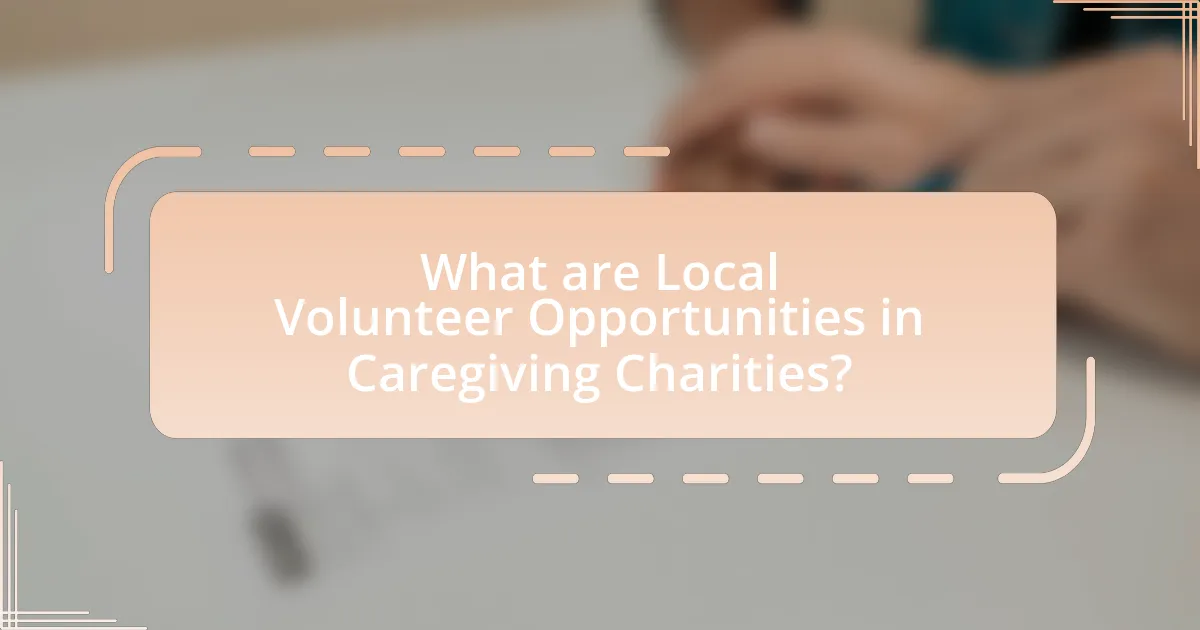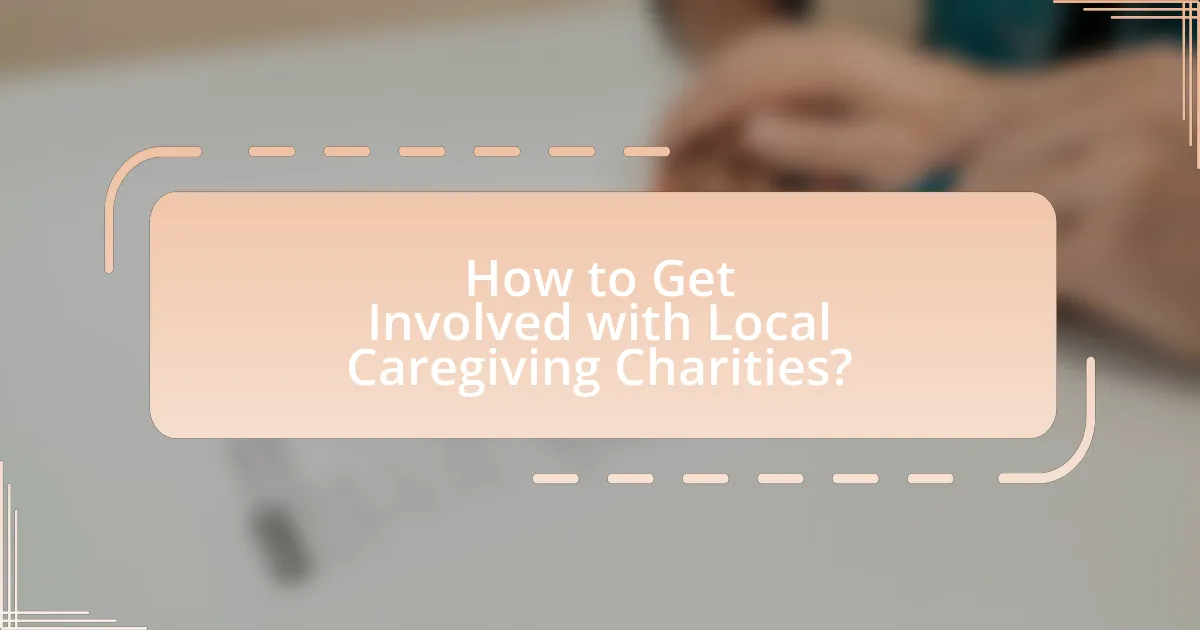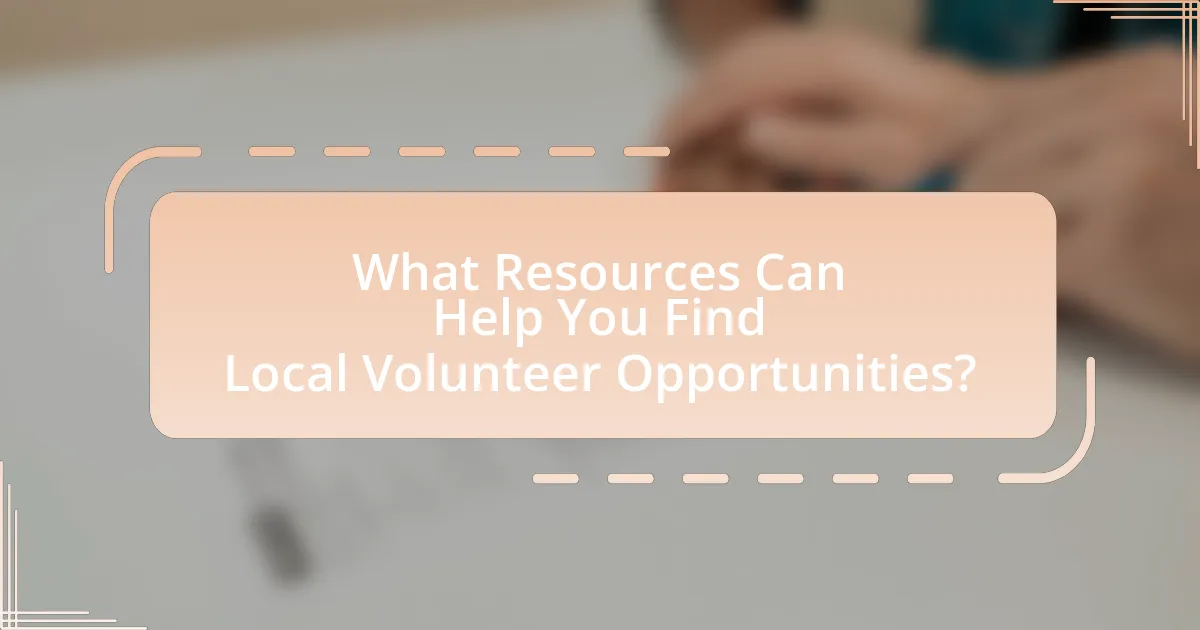Local volunteer opportunities in caregiving charities encompass various roles, including providing companionship, assisting with meal preparation, and offering transportation for medical appointments. This article outlines how to identify caregiving charities in your area using resources like online directories and community centers, as well as the importance of volunteering in enhancing the quality of life for vulnerable populations. It also discusses the types of volunteer roles available, the common responsibilities of volunteers, and best practices for securing these positions. Additionally, the article highlights the impact of volunteering on both caregivers and recipients, emphasizing the mutual benefits of community engagement in caregiving initiatives.

What are Local Volunteer Opportunities in Caregiving Charities?
Local volunteer opportunities in caregiving charities include roles such as providing companionship to the elderly, assisting with meal preparation, and offering transportation for medical appointments. Organizations like Meals on Wheels and local senior centers often seek volunteers to help deliver meals and engage with seniors, enhancing their quality of life. Additionally, hospice care programs frequently require volunteers to support families and patients during difficult times, which can involve administrative tasks or direct patient interaction. These opportunities not only fulfill essential community needs but also allow volunteers to gain valuable experience in caregiving and support services.
How can you identify caregiving charities in your area?
To identify caregiving charities in your area, start by searching online directories such as Charity Navigator or GuideStar, which provide comprehensive listings of registered charities. These platforms allow users to filter results by location and focus area, making it easier to find caregiving organizations nearby. Additionally, local community centers or hospitals often have information on charities that provide caregiving services, as they frequently collaborate with these organizations. According to the National Council of Nonprofits, there are over 1.5 million nonprofit organizations in the United States, many of which focus on caregiving, indicating a significant presence of such charities in various communities.
What resources are available for finding local caregiving charities?
Local caregiving charities can be found through several key resources. Websites such as Charity Navigator and GuideStar provide comprehensive databases of charities, including those focused on caregiving, allowing users to search by location and specific needs. Additionally, local community centers and hospitals often have information on nearby caregiving charities and volunteer opportunities. Social media platforms, particularly Facebook, host community groups where local charities may post about their services and volunteer needs. Furthermore, state and local government websites frequently list nonprofit organizations, including caregiving charities, that serve the community. These resources collectively facilitate the identification of local caregiving charities and their volunteer opportunities.
How do community centers and local organizations contribute to this search?
Community centers and local organizations play a crucial role in connecting individuals with volunteer opportunities in caregiving charities by serving as information hubs and facilitators. They often provide resources such as databases of local charities, host volunteer fairs, and offer workshops that educate potential volunteers about caregiving roles. For instance, a study by the Corporation for National and Community Service found that local organizations significantly increase volunteer engagement by 20% through targeted outreach and support programs. This demonstrates their effectiveness in mobilizing community members to participate in caregiving initiatives.
Why is volunteering in caregiving charities important?
Volunteering in caregiving charities is important because it directly supports individuals and families in need, enhancing their quality of life. Caregiving charities often serve vulnerable populations, such as the elderly, disabled, or those facing health challenges, and volunteers provide essential services like companionship, assistance with daily activities, and emotional support. Research indicates that volunteer involvement in caregiving can lead to improved mental health outcomes for both caregivers and recipients, as noted in a study published in the Journal of Health Psychology, which found that volunteering can reduce feelings of isolation and increase overall well-being.
What impact does volunteering have on the community?
Volunteering positively impacts the community by addressing social needs, fostering connections, and enhancing local resources. It provides essential services, such as food distribution and educational support, which directly benefit underserved populations. According to a study by the Corporation for National and Community Service, volunteers contribute an estimated $184 billion annually in economic value through their services, demonstrating the significant financial and social benefits of volunteer efforts. Additionally, volunteering strengthens community ties, as individuals engage with one another, leading to increased social cohesion and a sense of belonging.
How does volunteering benefit the caregiver and the recipient?
Volunteering benefits both the caregiver and the recipient by fostering a sense of community and enhancing emotional well-being. Caregivers experience increased satisfaction and reduced stress through meaningful interactions, while recipients gain companionship and support, which can improve their quality of life. Research indicates that caregivers who volunteer report higher levels of happiness and lower rates of depression, as they engage in purposeful activities that reinforce their social connections. Additionally, recipients often experience improved mental health outcomes due to the social engagement and assistance provided by volunteers, which can lead to better overall health and well-being.
What types of volunteer roles are available in caregiving charities?
Caregiving charities offer various volunteer roles, including direct care providers, administrative support, event coordinators, and outreach specialists. Direct care providers assist with tasks such as companionship, meal preparation, and transportation for individuals in need. Administrative support volunteers handle tasks like data entry, scheduling, and communication, ensuring the charity operates smoothly. Event coordinators plan and execute fundraising or awareness events, while outreach specialists engage with the community to promote services and recruit additional volunteers. These roles are essential for the effective functioning of caregiving charities, as they directly impact the quality of care and support provided to those in need.
What are the common responsibilities of volunteers in caregiving?
Volunteers in caregiving commonly assist with tasks such as providing companionship, helping with daily living activities, and offering emotional support. These responsibilities are essential for enhancing the quality of life for individuals receiving care. For instance, companionship can alleviate feelings of loneliness, while assistance with daily activities like bathing, dressing, and meal preparation ensures that individuals maintain their dignity and independence. Emotional support from volunteers can also significantly impact mental well-being, as studies have shown that social interactions contribute to improved health outcomes in caregiving settings.
How can volunteers specialize in certain areas of caregiving?
Volunteers can specialize in certain areas of caregiving by pursuing targeted training programs and certifications that focus on specific needs, such as elderly care, pediatric care, or mental health support. For instance, organizations like the American Red Cross offer courses in CPR and first aid, which equip volunteers with essential skills for emergency situations. Additionally, volunteers can gain experience through internships or shadowing professionals in their desired specialization, allowing them to develop practical skills and knowledge relevant to that area. This focused approach not only enhances their effectiveness in caregiving roles but also aligns their efforts with the specific needs of the communities they serve.

How to Get Involved with Local Caregiving Charities?
To get involved with local caregiving charities, start by researching organizations in your area that focus on caregiving services. Websites like VolunteerMatch and Idealist can help you find specific opportunities. Many local charities often seek volunteers for various roles, including direct caregiving, administrative support, or fundraising. According to the National Council on Aging, volunteering not only supports the community but also enhances personal well-being, making it a mutually beneficial endeavor. Engaging with local charities can also provide networking opportunities and increase awareness of caregiving issues in your community.
What steps should you take to apply for volunteer opportunities?
To apply for volunteer opportunities, first identify local caregiving charities that align with your interests. Next, visit their websites or contact them directly to inquire about available positions. After that, complete any required application forms and submit them along with your resume or relevant experience. Many organizations may also require background checks or interviews, so be prepared for those steps as well. Research shows that volunteering can enhance community engagement and personal fulfillment, making these steps crucial for effective participation in caregiving initiatives.
How do you prepare your application for a caregiving charity?
To prepare your application for a caregiving charity, gather all necessary documentation, including a resume, references, and any relevant certifications. This documentation demonstrates your qualifications and commitment to caregiving. Additionally, tailor your application to highlight specific experiences that align with the charity’s mission, showcasing your understanding of their values and needs. Research the charity to include relevant information that reflects your genuine interest and dedication. This approach increases the likelihood of your application being favorably considered, as charities often seek candidates who resonate with their goals and demonstrate a proactive attitude.
What documents or qualifications might be required?
To volunteer in caregiving charities, individuals may be required to provide documents such as a background check, proof of identity, and health certifications, including immunization records. Many organizations also seek qualifications like first aid and CPR certification, which demonstrate preparedness for caregiving responsibilities. These requirements ensure the safety and well-being of both volunteers and those they assist, as evidenced by the standard practices adopted by numerous caregiving charities to maintain a safe environment for vulnerable populations.
How can you connect with existing volunteers or staff?
To connect with existing volunteers or staff, reach out through the organization’s official communication channels, such as email, social media, or community events. Engaging in these platforms allows for direct interaction and fosters relationships with current members. Many caregiving charities also host volunteer orientation sessions or meetings, providing opportunities to meet and network with existing volunteers and staff in person.
What networking opportunities exist within caregiving charities?
Networking opportunities within caregiving charities include volunteer events, workshops, and community outreach programs. These events facilitate connections among caregivers, professionals, and organizations, fostering collaboration and resource sharing. For instance, many caregiving charities host annual conferences that bring together stakeholders in the caregiving community, allowing participants to exchange ideas and best practices. Additionally, local chapters of national caregiving organizations often organize meet-and-greet sessions, which serve as platforms for networking and building relationships. Such interactions can lead to mentorship opportunities and partnerships that enhance the effectiveness of caregiving efforts.
How can social media aid in finding volunteer connections?
Social media can significantly aid in finding volunteer connections by providing platforms where organizations post opportunities and individuals can network. For instance, Facebook groups dedicated to volunteering often share local events and needs, while LinkedIn allows users to connect with nonprofit organizations and professionals in the caregiving sector. According to a 2021 report by the Corporation for National and Community Service, 63 million Americans volunteered through an organization, with many discovering opportunities via social media channels. This demonstrates the effectiveness of social media in facilitating connections between volunteers and caregiving charities.

What Resources Can Help You Find Local Volunteer Opportunities?
Local volunteer opportunities can be found through various resources such as online platforms, community organizations, and social media groups. Websites like VolunteerMatch and Idealist allow users to search for volunteer positions based on location and interests, making it easier to connect with caregiving charities in the area. Additionally, local nonprofits often have their own websites or social media pages where they post volunteer needs. According to a 2021 report by the Corporation for National and Community Service, 77 million Americans volunteered, highlighting the importance of accessible resources for finding opportunities.
What online platforms are available for finding volunteer opportunities?
Online platforms available for finding volunteer opportunities include VolunteerMatch, Idealist, and All for Good. VolunteerMatch connects individuals with local nonprofits seeking volunteers, featuring over 100,000 opportunities across various causes. Idealist offers a comprehensive database of volunteer positions, internships, and jobs in the nonprofit sector, allowing users to filter by location and interest. All for Good aggregates volunteer opportunities from multiple sources, making it easy for users to find projects that match their skills and availability. These platforms are widely recognized for their extensive listings and user-friendly interfaces, making them reliable resources for those looking to engage in volunteer work.
How do websites like VolunteerMatch and Idealist work?
Websites like VolunteerMatch and Idealist function by connecting individuals seeking volunteer opportunities with organizations that need volunteers. These platforms allow users to create profiles, specify their interests, and search for local volunteer positions based on various criteria such as location, cause, and skills. VolunteerMatch, for instance, has a database of nonprofits that post their volunteer needs, while Idealist offers a broader range of opportunities, including internships and jobs in the nonprofit sector. Both platforms utilize algorithms to match users with relevant opportunities, enhancing the efficiency of the volunteer search process.
What role do local government websites play in this search?
Local government websites serve as essential resources in the search for local volunteer opportunities in caregiving charities. These websites typically provide information on community programs, volunteer initiatives, and local nonprofit organizations that focus on caregiving. For instance, many local government sites feature directories of registered charities, upcoming volunteer events, and contact information for organizations seeking volunteers. This centralized access to relevant information facilitates the connection between individuals looking to volunteer and the caregiving charities that need assistance, thereby enhancing community engagement and support for vulnerable populations.
How can local events and community boards assist in your search?
Local events and community boards can significantly assist in your search for volunteer opportunities in caregiving charities by providing direct access to information and networking opportunities. Community boards often post announcements about local events, volunteer needs, and specific caregiving initiatives, making it easier to identify where help is needed. For instance, attending community events allows individuals to meet representatives from caregiving charities, learn about their missions, and discover available volunteer roles. Additionally, local events often feature sign-up sheets or informational booths that facilitate immediate engagement with organizations seeking volunteers. This direct interaction can lead to more personalized opportunities that align with your skills and interests.
What types of events should you look for in your community?
You should look for community events that focus on caregiving, health awareness, and support for vulnerable populations. These events often include health fairs, caregiver workshops, fundraising activities for charities, and volunteer recruitment drives. For instance, health fairs provide resources and information on caregiving, while workshops offer training and support for caregivers. Fundraising activities help sustain local charities that assist caregivers and those in need. Engaging in these types of events not only enhances community support but also connects you with like-minded individuals and organizations dedicated to caregiving.
How can bulletin boards and flyers provide information on volunteer needs?
Bulletin boards and flyers effectively provide information on volunteer needs by displaying specific opportunities and requirements in a visible and accessible format. These tools often include details such as the type of volunteer work needed, the time commitment required, and contact information for organizations seeking help. For instance, community centers and local charities frequently utilize bulletin boards to post flyers that outline their volunteer needs, making it easy for individuals to identify opportunities that match their interests and availability. This method of communication is particularly effective because it reaches a broad audience in public spaces, ensuring that information is readily available to potential volunteers.
What are some best practices for finding and securing volunteer roles?
To find and secure volunteer roles effectively, individuals should utilize online platforms, local community boards, and networking opportunities. Online platforms such as VolunteerMatch and Idealist provide searchable databases of volunteer opportunities tailored to specific interests and locations. Local community boards often post volunteer needs from nearby charities, making them a valuable resource. Networking with friends, family, and community members can also lead to referrals for volunteer positions, as personal connections often yield opportunities not widely advertised. According to a 2021 report by the Corporation for National and Community Service, 77% of volunteers found their roles through personal connections, highlighting the importance of networking in securing volunteer positions.